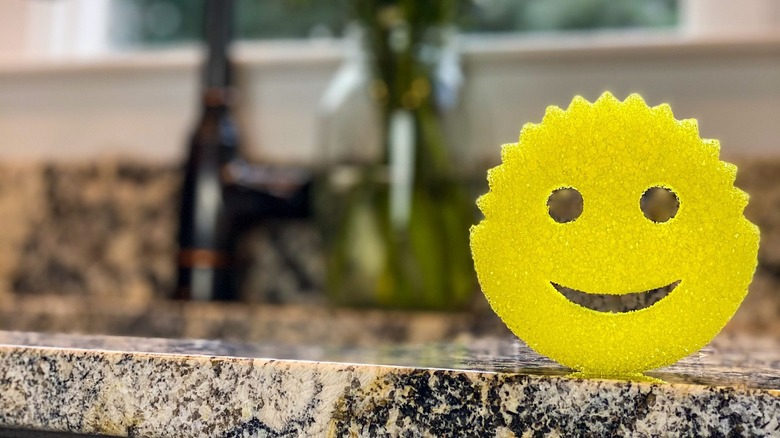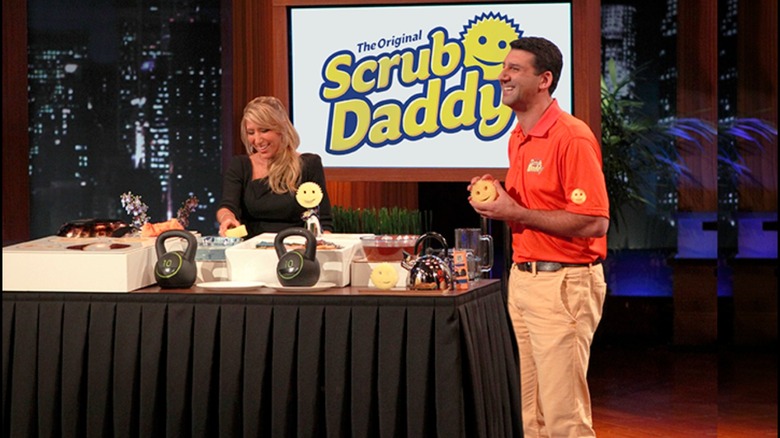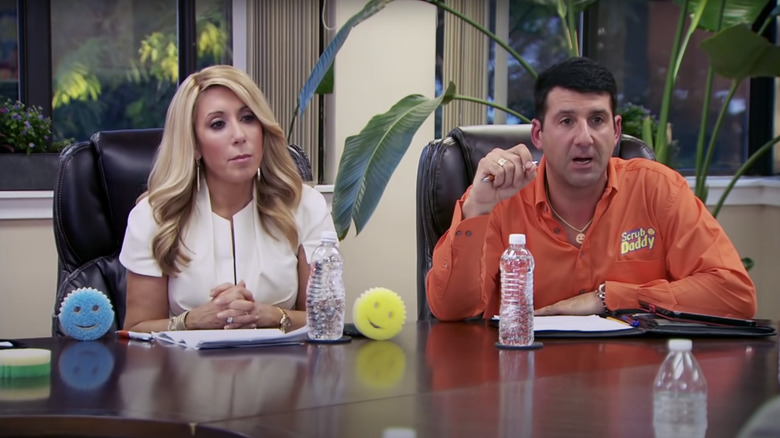Whatever Happened To Scrub Daddy Sponge After Shark Tank Season 4?
In 2007, Aaron Krause invented a urethane foam hand scrubber marketed toward auto shops, but it didn't take off. Krause set his leftover scrubbers aside until 2011, when he discovered that the foam could change textures in water of different temperatures while washing his outdoor furniture. When he tried the foam pads on dishes, it cleaned them quickly and efficiently without scratching them. Krause began launching his business, Scrub Daddy, and took his product onto QVC several times, where it proved successful, and got it into five stores around Philadelphia.
To expand his business, Krause knew he'd need the help of an investor and after seeing an episode of "Shark Tank," decided to bring Scrub Daddy into the tank. By the time Krause appeared to film the show, the smiley face scrubber had been on the market for 4 months and had made a little more than $100,000 in sales. Krause hoped that with the help of a shark, he'd be able to sell his product in more locations. "I know exactly what I need to do to make this thing really efficient, and I'm looking to add a strategic partner who can open this up into retail stores," Krause told the sharks.
A Shark Tank bidding war breaks out over Scrub Daddy
When Aaron Krause brought his cleaning product, the Scrub Daddy, into the tank, he hoped to secure an investment of $100,000 in exchange for 10% of his company. Krause's pitch was more like an infomercial, where he showed the sharks how Scrub Daddy hardens in cold water, softens in hot water, and can remove burnt food from stove tops and pans with only water. The eyes of the smiley face featured on the scrubber allowed the user to get a better grip when washing dishes, and the opening for the mouth was perfect for quickly cleaning utensils.
Though Robert Herjavec and Mark Cuban seemed uninterested and dropped out quickly, Daymond John, Kevin O'Leary, and Lori Greiner entered a bidding war over the Scrub Daddy. In the midst of constantly changing offers, Greiner promises Krause she could turn his business into a huge success. "I'll make you a millionaire within a year," Greiner said. Krause agreed to a deal with Greiner, $200K for 20% equity.
Scrub Daddy blows up after Shark Tank
The airing of the "Shark Tank" episode immediately brought lots of customers to Scrub Daddy's website, and the following day Aaron Krause and Lori Greiner sold thousands of scrubbers within minutes of being on QVC. Though Scrub Daddy had started to see some success before appearing on the show, it quickly gained traction after the show. "When the episode aired in October 2012, the business exploded and it hasn't slowed down since," Krause said in an interview with CEO Magazine.
By 2014, the company had enough resources to construct a new headquarters and developed partnerships with large retailers across the country, including Target, Bed Bath & Beyond, Home Depot, Walmart, Kroger, and Meijer. Scrub Daddy was also named "Shark Tank's most successful product to date." Krause told the Washington Post that being on "Shark Tank" brings great potential for expanding a business. "The exposure is just like a launching pad," Krause said. "It could get you tossed right off the boat, or it could launch you to the moon. It's kind of how you deal with it."
Scrub Daddy continues to thrive to this day
Last year marked 10 years since Scrub Daddy appeared on "Shark Tank," and the once-small company has ballooned into a huge success. In an updated episode of the show, the creator of the now-famous product explained how much his business had changed in the last decade. "When I pitched to the sharks, we only had $100,000 in retail sales and one product, and now in 10 years the company has 273 employees," Aaron Krause said. "We have 160 products and we're sold in 257,000 retail locations. Scrub Daddy is one of the top 5 grossing companies in 'Shark Tank' history, doing over $670 million in retail sales."
In the update episode, Krause revealed that he and Lori Greiner were looking to partner with Unilever, the largest producer of soap products, with the hope of bringing Scrub Daddy to locations across the globe. From before its time on "Shark Tank" to more than a decade later, the company has continued to grow and invent new products for its customers.
What's next for Aaron Krause?
Aaron Krause has been the brains behind Scrub Daddy since he invented the product in 2011 and continues to act as the company's President and CEO and invent new products. Several new products are currently featured on Scrub Daddy's website, including mops, dish soap, dish drying mats, cleaning paste, and new eco-friendly Scrub Daddy sponges made of recycled plastic and coconut husks.
At the start of this year, Scrub Daddy officially teamed up with Unilever and plans to continue promoting the product in the United States as well as other countries. "This global co-branding partnership represents a major milestone in the worldwide growth and recognition of our Scrub Daddy brand," Krause said in a press release. "By partnering with Unilever, one of the largest and most reputable consumer goods companies in the world, and their internationally famous CIF brand of cleaning products, we are well positioned for exponential growth both in the USA and internationally." Scrub Daddy has been one of "Shark Tank's" most successful companies to date, and Krause doesn't seem like he'll quit any time soon.


